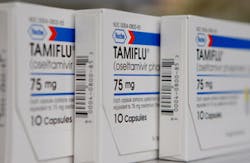When the swine flu pandemic became a global issue in 2009 and 2010, Roche's influenza treatment drug Tamiflu became a household name. The drug has been approved in more than 100 countries and has been widely used to prevent and treat influenza globally.
But a new study by global non-profit research network the Cochrane Collaboration, published in the British Medical Journal, raises concerns that the effect of the vastly popular pharmaceutical product may have been overestimated. For their study, researchers at the Cochrane Collaboration examined 107 clinical trials of the antiviral drugs Tamiflu and Relenza, focusing on the results from 46 of those in detail. Results showed that Tamiflu did very little to reduce the risk of hospitalization or developing complications from the flu. However, the study did not question the fact that the drug could treat the flu.
Researchers have called for governments around the world to review their policies on stockpiling Tamiflu, claiming that investing billions of dollars to ensure there were sufficient amounts of antiviral drugs was pointless, since there were no indications Tamiflu could effectively curb a global outbreak.
Figures from the Government Accountability Office, quoted by the Wall Street Journal, show that the United States has spent approximately $1.3 billion on stockpiling Tamiflu and other antiviral drugs. Globally, sales of Tamiflu reached $3.6 billion in 2009 alone.
